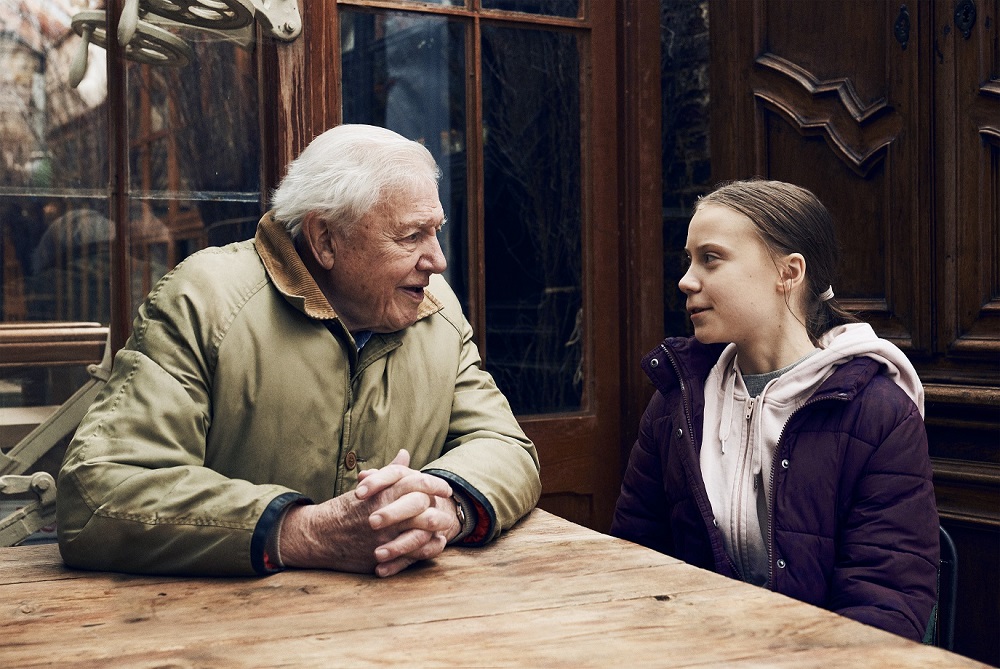KUALA LUMPUR, June 9 — There’s no denying Swedish climate activist Greta Thunberg has a way with words, especially getting world leaders to face up to the impacts of global warming.
Just ask ex-US president Donald Trump whose heated tweets with the teenage environmental icon became one of social media’s most well-known feuds that carried on until he left the White House.
In an interview with Malay Mail and other international press, the 18-year-old had this to say about the very public contretemps between her and Trump, an ardent climate change denier.
“I hope he’s enjoying himself but I don’t miss him.
“I think it’s time for the world to move on from that era,” she said last Friday via Zoom.

The famed teenager was promoting her latest documentary Greta Thunberg: A Year to Change the World by BBC Studios which follows the climate activist around North America and Europe from August 2019 to late 2020 to explore the science behind the climate crisis, how it impacts humans and our ecosystems, and possible solutions.
Greta was scheduled to visit Asia but production was cut short due to Covid-19.
Among many things, she would have liked to explore issues related to coal-powered plants and manufacturing in this part of the world.
Southeast Asia clocked in the fastest carbon dioxide emissions growth in the world between 1990 and 2010, noting an excessive reliance on fossil fuel, deforestation and land degradation as the main factors driving emissions, according to the Asian Development Bank.
The International Energy Agency also revealed in 2019 that in the last 20 years, overall energy demand in Southeast Asia grew by more than 80 per cent and is expected to grow by 60 per cent by 2040.
The impact of climate change in our part of the world, say environmental experts, will come in the form of more intense typhoons and floods.
Despite the science, Environment and Water Minister Datuk Seri Tuan Ibrahim Tuan Man has said Malaysia is not vulnerable to climate change, pertaining to the country’s exclusion at the US-organised Climate Action Summit in April.
His ministry later clarified that all countries, Malaysia included, are not spared from climate change after public backlash.
“The climate crisis is a global problem and it will eventually affect everyone,” Thunberg said.
“Even though we’re not sitting in the same boat, we are in the same storm.
“We are not going to be hit differently but we will be hit and so I think it’s quite delusional to still believe that we will be able to adapt.”
She added that in some parts of the world, people will be able to adapt as long as there is access to money and infrastructure.
Many in vulnerable areas won’t be afforded that privilege.
“The people who won’t be able to adapt are going to have to move somewhere so it doesn’t make sense to have that approach.”
Known for openly admonishing global leaders for their lack of climate action in favour of economic abundance, Thunberg was asked if her approach would be different when it comes to leaders in Asia where the culture is less confrontational.

“Whether your rhetoric is confrontational or not, we’ll have to face the science and no matter where in the world you live, the science is a fact we simply need to accept,” she said.
While it’s easy to assume the climate justice advocate spends much of her time worrying about what her future would look like, Thunberg admitted otherwise.
“I try to focus on the present and try to change that future while I still have that possibility to do so.”
In recent times, concerns about the planet’s future and humanity’s long-term survival have launched a new space race with tech billionaires Elon Musk and Jeff Bezos setting their sights on extraterrestrial pursuits in the event Earth becomes uninhabitable due to natural or human-made disasters.
“I understand there are huge possibilities and opportunities in (space colonisation) and that it’s very exciting.
“It’s a very interesting topic but I think we should maybe in the first-hand focus on actually repairing the planet we are living on right now.
“Yes, we could colonise Mars but it’s much easier to just leave the carbon in the ground,” Thunberg said.

Her Nobel Peace Prize nominations, all three of them among other accolades, and being the face of climate change might make Thunberg far from the ordinary 18-year-old but at home in Stockholm, it’s the simple pleasures that bring her joy.
In fact, Thunberg who has Asperger’s, high-functioning autism and obsessive-compulsive disorder demonstrated her knack for multitasking during this interview when she was putting together a jigsaw puzzle which relaxes her.
She enjoys dancing for fun — “more like a silly freestyle dance” — and cracks jokes with her international Fridays for Future community, the youth-led movement Thunberg inspired when she started skipping school on Fridays to protest outside the Swedish parliament.
“I do sewing, embroidering, knitting and crocheting.
“I also spend a lot of time with my dogs, I do a lot of reading and listening to audiobooks.
“I do lots of things!” said Thunberg.
Greta Thunberg: A Year to Change the World premiered on June 5. Catch new episodes of the three-part documentary every Saturday at 8.05pm on BBC Earth (unifiTV Channel 501). Also available on BBC Player.






















